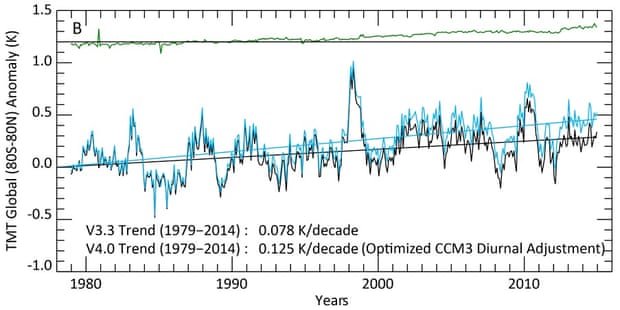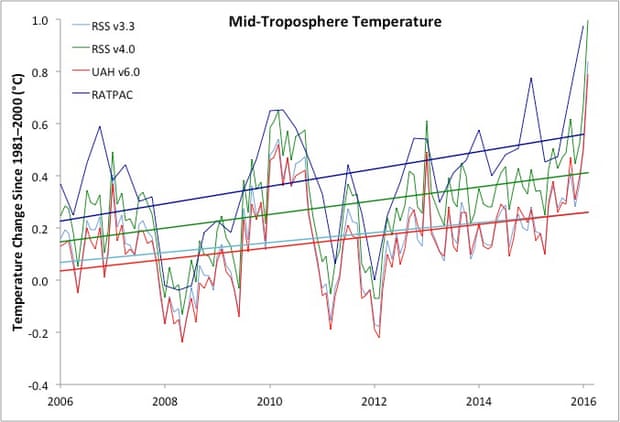Ted Cruz's favorite temperature data just got a lot hotter
Posted on 3 March 2016 by dana1981
In a new paper, Carl Mears and Frank Wentz at Remote Sensing Systems (RSS) have revised their data set estimating the temperature of the Earth’s atmosphere. At his recent congressional hearing, Ted Cruz presented the RSS data to incorrectly claim that there’s been no global warming in over 18 years.
Even other estimates of the atmospheric temperature, of the same satellite data by scientists at the University of Alabama at Huntsville (UAH), and by weather balloons, indicate that the atmosphere is warming. Ted Cruz cherry picked RSS because it was the lone outlier that seemed to support his preferred argument against the need to take action to mitigate the risks posed by human-caused global warming.
That’s no longer the case. In their new paper, Mears and Wentz detail the revised RSS method to account for drift in the time of day at which satellites measure the same location on Earth (known as “diurnal drift”, discussed by Mears at the 0:47 mark in the above video). They applied a method suggested by Stephen Po-Chedley and colleagues at the University of Washington in an important paper covered by John Abraham last year. As a result, the new version of RSS (v4.0) shows about 60% more warming than the previous version (v3.3) since the record began in 1979.

RSS mid-troposphere temperature, v3.3 and v4.0. Illustration: Mears & Wentz (2016), Journal of Climate.
This new adjustment also helps to reconcile the divergence between atmospheric temperature estimates from satellites and weather balloons. Over most of the temperature record, the estimates using the two different types of instruments have been similar, and the satellite data are calibrated with the weather ballon data. However, over the past decade, the weather balloons had shown significantly more atmospheric warming than the satellite estimates. RSS v4.0 goes a long way toward bringing these measurements into closer agreement.

Mid troposphere temperature estimates and linear trends (2006–2015) from RSS v3.3, RSS v4.0, UAH v6.0, and weather balloons (RATPAC). Illustration: Dana Nuccitelli
As Joe Romm noted at Climate Progress, Roy Spencer and John Christy at UAHspeculated over 4 years ago that the RSS diurnal drift correction method was introducing a cool bias into their record.
my UAH cohort and boss John Christy, who does the detailed matching between satellites, is pretty convinced that the RSS data is undergoing spurious cooling because RSS is still using the old NOAA-15 satellite which has a decaying orbit, to which they are then applying a diurnal cycle drift correction based upon a climate model, which does not quite match reality.
This new paper and latest RSS adjustment once again highlight the challenges scientists face in converting measurements of atmospheric microwave emissions by satellites in orbit into a synthetic temperature estimate. It’s a complicated process that requires a complex model with large uncertainties involved, and as Carl Mears has noted, it’s certainly unwise to rely exclusively on these estimates of one small component of the Earth’s climate to evaluate global warming.
Nevertheless, Spencer has just reported that February 2016 was the hottest month on record in the UAH data set; the same is true of RSS, and weather balloons are also registering record hot atmospheric temperatures, as the above chart shows.
It’s now clear that Senator Cruz has been hoisted by his own petard.































 Arguments
Arguments






























I am encouraged by the continuously improved understanding of what is going on.
However, I seriously question the claim that “It’s now clear that Senator Cruz has been hoisted by his own petard.”
The likes of Cruz do not appear to suffer any real consequences when better understanding that proves they were wrong arises.
Fundamentally, the lack of nearly immediate significant consequences for the likes of Cruz is the problem. They clearly play this game to delay losing, because maximizing the personal rewards they get in their lifetime is their primary interest.
There is little hope for humanity to advance to a better future as long as 'developing and disseminating deliberately misleading information to promote and prolong activity that can be understood to be contrary to the advancement of humanity to a lasting better future for all' can be gotten away with.
And since many of the wealthy powerful people today understand that their wealth and power came from getting away with actions they could understand were not going to advance humanity to a lasting better future for all there is little momentum in global leadership to actually admit how unacceptable things have become.
The core supporters of the likes of Cruz will likely remain entrenched solidly behind him. Many of them are probably unaware that he most likely knew he promoted the presentation of deliberately misleading information through the US Government position he holds and can abuse. And the ones among his core supporters who learn about the unacceptability of what he did will probably consider it to be another reason to become an even more committed supporter and defender of him, because what he did suits their interests.
We also just smashed through the limits set just a few weeks ago by the entire international community, at least for monthly (1.5 C in Feb) and daily (2 C on March 3, northern hemisphere) anomalies.
robertscribbler.com/2016/03/03/the-roof-is-on-fire-looks-like-february-of-2016-was-1-5-to-1-7-c-above-1880s-averages/
LINK
[RH] Shorten link that was breaking page format.
Grist now covering the issue: grist.org/climate-energy/global-warming-is-now-in-overdrive-we-just-hit-a-terrible-climate-milestone/
The latest UAH satellite temperature data also shows a huge temperature spike for February 2016. Any so called recent "pause" in this data looks well and truly over.
Mann has said the spike we are seeing cannot be explained by El Nino alone. Besides underlying, ongoing GW, might we be seeing some result of the removal of some of the 'aerosol umbrella' of coal plant aerosols now that China's economy is slowing down and since it is supposedly working to close down the dirtiest coal plants?
One Panet Only @1.
I broadly agree. Cruz's core supporters will be slow to change their views. They are the modern equivalent of the flat earth society, and will not change until temperatures are truly off the scale. Cruz is manipulating them for political purposes.
Cruz is locked into his views now, and wont want to lose face by admitting he was wrong. Basically the science is unfortunately being dominated or sidelined by a huge range of social / political forces and human failings.
Does RSS 4.0 have any bearing on the existence or non-existence of the tropospheric hotspot?
martin
Possibly. TMT, even with the new Diurnal Drift adjustments, still has a significant stratosperic signal included with it. Their TTT product (also V4.0) attempts to remove some of this.
An interesting comparison might be TTT vs surface in the Tropics.
I feel like this public examination of the satellite data's limits and uncertainties is finally catching up with the Cruz's abuse of that data. I've been trying find information on why RSS is different for several years now and it's been hard to find. Glad that gap is finally closing.
While TMT and TTT are scientifically interesting things to better understand, it is clearly the trend in TLT (the values below more of the excess CO2 known to be the result of burning fossil fuels and deforestation to grow commodities that already fortunate people can profit and benefit more from), that would be more relevant as a comparison to the trend of global average surface temperatures (which is clearly the more relevant surface temperature data, particularly the surface data evaluations that include the polar regions since satellite evaluations do not include the polar regions).
It is also interesting, but not really relevant to the evaluation of the impact of excess CO2 from human burning of fossil fuels, that UAH (Spencer and Christy) have recently presented their evaluation of the RSS update (on Dr. Roy Spencer's website), but chose to first report their evaluation of TMT. They have pointed out a couple of reasons they would consider UAH TMT more 'accurate' than RSS TMT. And it appears they wish to imply that their cherry-picked points of critcism in the TMT evaluation by RSS should be the basis for deciding which method of 'guessing how to manipulate the satellite data to represent temperature values' is the better one (with the default claim being that the interpretation of satellite data that UAH is currently on version 6 of is somehow the only valid measure of the human impacts - which isn't really their claim because their presentations to date appear to be based on the fundamental position that the burning of fossil fuels is not a matter of concern and their job is to develop and deliver the 'best possible information in support of that preferred belief').
Clearly, a major impediment to the advancement of humanity continues to be the potential for people who have little interest in advancing humanity to a lasting better future for all to knowingly abuse deliberately deceptive marketing to drum up unjustifiable popular support for irresponsible, unsustainable and damaging economic and political actions. The wealthiest and most influential among these people understand that the required changes to advance humanity would include stopping 'their callous greedy pursuits of personal reward any way they can get away with'. Their motivation is clarly to try anything they think they can get away with to delay the advancement of human understanding and development of a lasting better future for all, including trying to focus the discussion heard about by the general population on the trends of a selective method of determining TMT from satellite data. The objective is to create the impression that the less reliable and less relevant satellite TMT evaluations are strong evidence that any trend in the global average surface temperature data is wrong (it is also an attempt to distract attention from the other clear indications of the unacceptable results of the massive burning of fossil fuels and deforestation being gotten away with for the benefit of already fortunate people to the detriment of the future of humanity).
Supplemental reading:
Adjusted satellite data derails one of Cruz’s arguments against climate change by Elizabeth Koh, Dallas Morning Herald, Mar 6, 2016
More supplemental reading:
Ted Cruz’s favorite argument about climate change just got weaker by Chris Mooney, Energy & Environment, Washington Post, Mar 7, 2016
Carl Mears has responded to criticisms (mostly Roy Spencer's) of the RSS 4.0 update. (Hat tip to barry at Open Mind)